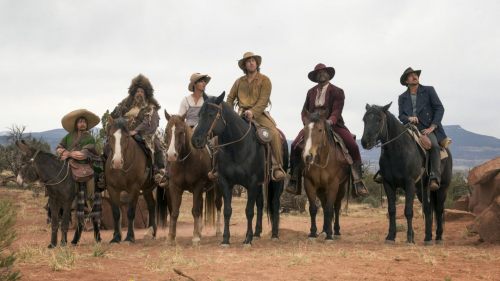Is BRIGHT 2 The First True Piece Of Clickbait Cinema?
By many accounts, Bright is a tremendous hit for Netflix. As our own business analyst James Shapiro put it:
"Variety, in partnership with Nielsen, is saying that Bright garnered 11 million viewers over its first three days (essentially its “opening weekend”). They also estimate 7 million of those viewers were in the all-important 18-49 age group. Also important, the film played like a traditional studio tent pole in that it skewed slightly (56%) male. If we take the 11 million number, and apply the average 2017 ticket price, we get to an opening weekend box office (again, for conversation purposes only) of around $98 million."
That's a massive number, and James even goes on to call the rating a potential "underestimate", as the number doesn't include mobile figures or international views. That'd place it at #2, in terms of star Will Smith's B.O. openings, right behind his previous collaboration with David Ayer, Suicide Squad.
By many accounts, Bright is also a tremendous turd of a motion picture. Indiewire's David Ehrlich minced zero words by labeling it "The Worst Film of 2017" in the headline of his review, a savaging that actually attracted the attention of its director, and prompted this rather classy (but still pretty hilarious) response. Even BMD's Evan Saathoff (who - like this writer - is a known apologist for Ayer's Sabotage) couldn't muster up a whole lot to like in his "forty-degree day" defense:
"Bright frustrates mostly because it’s such a waste. While derivative and about as deep as a high school essay on the Civil Rights Movement, there is potential here for an interesting fantasy world explored by a somewhat likable pair of characters. But the film almost seems to go out of its way to ignore that potential. News that a sequel is already in the works is actually welcome, but only with a creative team interested in actually exploring what’s been set up here. The film ends with Ward and Jacoby in very promising places, and I would love to see that play out. Instead, we’re probably going to get a movie in which Jacoby and Ward still hate each other while investigating more dirty cops and saving the world from another bunch of Elf bullshit. And it’ll be yet another movie that robs us of true David Ayer craziness in service of mainstream pandering, which he sucks at."
Here's the thing, though: people seem to really like Bright. One look at Rotten Tomatoes shows that the movie's already netted an audience score (polled from 14,000+ votes) of 88%. Right in the middle of the page - where there's a yellow-bannered break labeled Audience Reviews For Bright - a sharp contrast between critics and audiences is illustrated. Super Reviewer Jens S. calls the central fantastical concept for the picture "fascinating". Another SR - KJ Proulx mildly champions Bright with "even if the end result is mostly uneven, the fact that Netflix was willing to take a risk with something that definitely wouldn't be for everyone is commendable." To wit, audience members seem a lot more forgiving toward the flawed film than their professional counterparts.
We've seen before how Audience Scores can be manipulated - via the curious case of The Last Jedi - so maybe the percentage itself can be taken with a grain of salt. But it takes a lot more passion to spill actual words of praise than it does to try and shift numerics (one would hope, at least). After all, it wouldn't be the first time audiences and critics clashed over the perception of a picture, and Ayer (being a product of the now rickety DCEU blockbuster machine) knows that as well as any working tentpole filmmaker.
However, with the sequel to Bright being greenlit - complete with Ayer and Orc Cop co-star Joel Edgerton returning - it's difficult now not to wonder if the relative goodness of Netflix's first large-level "franchise" matters at all. Though film writers thrashed it, and audiences have mildly reclaimed it as their own (complete with a Twitter narrative of "don't listen to the critics" that appears when you search "Netflix Bright"), it might actually be a massive win for the streaming giant, that simultaneously plugs a new torpedo into the side of quality cinema. For a company that's long been sniped for failing to market their movies properly, riding a wave of "any press is good press" might be their most intelligent move, as the more clicks either side of the debate generates, the easier it is for their original product to be calculated into your personal viewing algorithm.
Bright 2: Shine Bright Like a Diamond could also become the movie that truly shows off Netflix's "shelf life" theory, which assumes that audiences will "discover" one of their original features in their digital library over time. Though they've always been cagey with releasing numbers (as James also pointed out in his previous piece), it'd be a perfect moment for the company to control the narrative of how Bright was received at all. Combine a rejection of the critics' scores, a championing of the RT number, and then release that the movie has been discovered little-by-little through tracking over the weeks, months, and years leading up to Shine Bright Like a Diamond, and all the sudden, "The Worst Film of 2017" becomes "The Misunderstood Gem of 2017", and we have Bright 3: All Of the Lights to look forward to in 2021 and Bright 4: Shine On You Crazy Diamond in 2023. More clicks on each means Netflix can continue porting their product into those ads that automatically play when you log on or finish a film, suggesting you pet a slug while wondering where the hell all the old movies went.
What's fascinating (at least to this writer) is seeing Bright greenlit the day after Logan Paul became one of the first big New Media news stories to hit three days into 2018. In case you're unfamiliar with this case study in bizarre human nature, on December 31, Paul uploaded a video from his travels in Japan, detailing a trek into the famous Aokigahara “suicide woods” near Mount Fuji. There he stumbled upon the corpse of a suicide victim - a man who had apparently recently hanged himself. Paul showed the body (oof), albeit with the face blurred out (ehhh), but then filmed his own reaction, which was the emotional equivalent of some garish unboxing video where a man tears open his torso to find there's no soul intact (Jesus Christ...). The kid got slammed accordingly by the internet, including Breaking Bad star Aaron Paul (no relation), who instructed him to "go rot in hell".
There's no 1:1 comparison here, but watching the kid get jacked up, only to simultaneously broaden his audience in the process (I'd personally never heard of Logan Paul before yesterday) brought an entirely new meaning to the phrase "critic proof". The same feels true of Bright - a movie that was generally deemed a giant act of stupidity on Netflix's part, but then that narrative was parlayed into an audience-generated "us versus them" situation, that may be exploited to its maximum potential. Logan Paul apologized, and will continue to make videos, nursing a narrative of "learning" from the experience, having not yet lost enough followers on Twitter to drop below 3.95 million (and an extended public who now know who the fuck he is and will certainly hate-click his shit). It's failing upward on a near Trumpian level of remarkability, as morbid curiosity is always the hardest urge to suppress.
Again, the same goes for Bright, as Netflix will undoubtedly tout increases in subscription when they release their next set of numbers - which equates to a larger audience for the next installment in their urban fantasy drama. In fairness, they may actually make a good movie with Bright 2, as Ayer might be able to refill his cup of "craziness" that Mr. Saathoff and myself so long to drink from again with a little studio freedom. But even if they don't, the net result will probably be the same. Unless a full-tilt rejection of the first Bright happens during production (as they've already booted writer Max Landis, ridding themselves of a possibly brewing sex scandal), Netflix might've somehow manufactured a system in which quality doesn't really matter...at least until they fuck up the next one and need to spin the sequel into a brand new public storyline for us to swallow.



